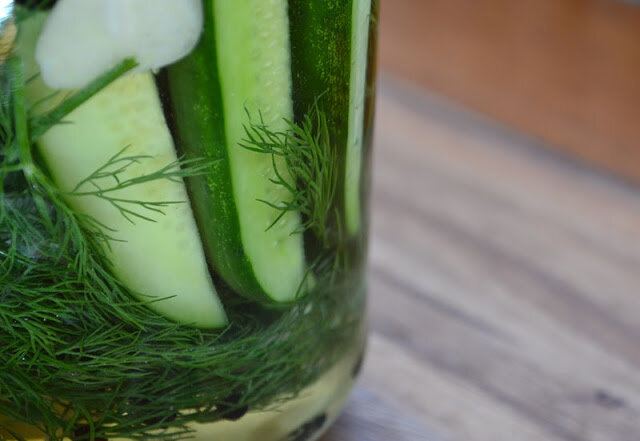Fermented Garlic & Dill Cucumber Pickles
I have made lacto-fermented dill pickles for the last, oh I don’t know, ten years or so. They are something I look forward to making every year when the cucumbers are exploding off the vines. We eat through them so quickly that I usually make at least four or five batches throughout the season. I’d totally make more if we had more refrigerator space (unlike canned pickles, fermented pickles need to be stored under refrigeration). They are absolutely delicious and probably the easiest thing to make. Seriously, they're super easy. And they're super healthy, too.
Now what is lacto-fermentation and how on earth are pickles healthy? Well, these pickles are made sour not by vinegar, but by natural beneficial bacteria. Lacto-fermentation happens when the starches and sugars in vegetables and fruit convert to lactic acid by a friendly lactic-acid producing bacteria. Basically, fermented vegetables will give you the same digestive and immune system boosting benefits of cultured yogurt with the added bonus of vitamins, which dramatically increase during the fermenting process. Lacto-fermentation is the old fashioned way of making pickles, and honestly, the only way I’d ever make pickles.
The fermentation process might sound daunting to someone who has never done it, but trust me when I say, this method is far simpler than making vinegar pickles and canning them. And it’s almost impossible to mess them up. I really mean it! Just know that after a few days, the water will turn cloudy and foamy and the cucumbers will start to look a little dull in color. You may see bubbles and you may even see some slime form on the top of the water. Do not be afraid, though! That is totally normal and natural. Use your nose and your senses. As long as your pickles and brine smell good, you'll be fine. And if there happens to be some funky colored mold growing on the surface of the brine, just scoop that off and the pickles under the brine will be perfectly safe. Add some fresh brine if you need to top off the jar. Now, if your pickles smell really off and are super slimy and unappetizing (which, honestly has maybe happened once or twice in all my years of making these), this probably means your brine is contaminated with some unfriendly bacteria, so toss them and try again.
You can leave the cucumbers whole or if they’re really large, you can cut them into spears so they can fit more easily into the jars. Just keep in mind that they will ferment quicker if they are cut versus left whole.
Garlic Dill Pickles
(This recipe makes 1 quart sized jar, but I always scale up this recipe and make about a gallon at a time in gallon or half-gallon jars)
4-5 kirby cucumbers (pickling cucumbers), washed very well and quartered lengthwise
1 small bunch of fresh dill, flowering dill, or dill seeds (not dried dill weed)
3-4 large cloves of garlic, sliced
1 tsp whole peppercorns
For the brine (use this ratio for any and all fermented vegetables you want to make, it’s a classic and all-purpose fermenting brine):
1 1/2 tablespoons unrefined sea salt or pickling salt (not iodized salt)
2 cups filtered, purified, or distilled water
Optional but highly recommended: Add 2 or 3 large fresh grape leaves to the bottom of each quart-sized jar, as this helps keep the pickles crisp.
1. Put garlic, peppercorns, and dill in the bottom of the jar. Add the grape leaves, if you’re using them. Add the cucumbers vertically until they all snugly fit into the jar. Make sure they're in there nice and snug! Be sure there is about 1 1/2-2 inches of space between the top of the cucumbers and the opening to the jar.
2. In a pitcher or bowl, add the salt and water and stir very well until the salt has dissolved. This is your brine.
3. Pour the brine into the jar over the cucumbers until the they are completely submerged in brine. You don't want any cucumbers poking out of the brine. The salty water keeps bad bacteria from gorwing and promotes good bacteria to multiply.
4. Place the lid on the jar. Let the jar sit out on your countertop for at least 3 days. I made a great batch by leaving them our for 5 days. They were nice and sour. But time will vary, based on the ambient temperature and all you need to do is taste them to see if they're sour enough. When they're to your liking, put the jar in the refrigerator and they keep really well for quite awhile, so long as they are always submerged in brine.

